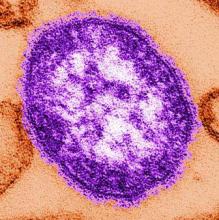An outbreak of measles in infants who were too young for routine immunization with the MMR vaccine occurred in an Illinois day care center, highlighting the vulnerability of infants younger than 1 year to measles infection.
“With the continued threat of measles importations from endemic countries and the recent resurgence of cases in the United States, it is critical to institute measures to protect this susceptible population,” researchers led by Dr. Whitney J. Clegg wrote online (J Pediatric Infect Dis Soc. 2016 March 24. doi: 10.1093/jpids/piw011). “Although infection among infants cannot be prevented through routine vaccination and herd immunity does not provide 100% protection, other strategies are effective in protecting this population from measles during future outbreaks. These include maintaining a high index of suspicion for measles in unvaccinated individuals presenting with a febrile rash illness and ensuring that those caring for infants have documented evidence of immunity.”
Dr. Clegg, an applied epidemiology fellow with the Illinois Department of Public Health, and his associates reported on an outbreak of 15 confirmed measles cases that occurred during January and February of 2015 in Cook County, Ill. Of the 15 cases, 12 (80%) occurred in infants aged 3-11 months who attended the same child care center. One of the cases, a 7-month-old male infant, was hospitalized for near-daily fevers and respiratory symptoms. Clinicians suspected Kawasaki disease, but that was ruled out 26 days after initial rash onset through positive measles-specific IgM serology. The child attended the day care only once during the time he was infectious, but delayed recognition of measles “led to continued transmission within the child care center,” the researchers wrote. “High vaccination rates in the community, especially among child care attendees aged [1 year and older] and among staff caring for the infants, likely led to containment of the outbreak primarily among individuals too young to receive their first dose of MMR vaccine.”
Among the 11 other infant cases, 5 visited outpatient clinics during their infectious period, exposing 33 infants. The three remaining confirmed measles cases were adult females who ranged in age from their late 20s to early 40s. One was the mother of a child care center attendee with confirmed measles.
“No direct connection could be made between the other two adults and the child care center attendees other than geographic proximity,” Dr. Clegg and his associates said. “The three adults reported unknown vaccination histories and denied personal or religious objections to immunizations; all had children that were up to date with their vaccinations. All cases resided in or attended child care in the same city within Cook County. No cases in this outbreak reported a travel history or contact with ill individuals who recently traveled.”
In all, 91 contacts of the 15 measles cases were monitored, and 20 received postexposure prophylaxis. The researchers noted that an important part of the outbreak investigation was identifying health care workers and child care center staff who worked closely with susceptible children and ensuring documentation of measles immunity. “Three health care workers with no vaccination records available were identified at the exposed pediatric clinics,” they noted. “Obtaining documentation of vaccinations, time taken away from regular clinic activities, and preventable work exclusions during an outbreak can be costly for health care facilities. These costs, as well as measles infection and transmission, could be avoided by ensuring all health care workers have the necessary documentation readily available at their facility.”
The report was supported in part by an appointment to the Applied Epidemiology Fellowship Program administered by the Council of State and Territorial Epidemiologists and funded by the Centers for Disease Control and Prevention. Dr. Clegg and his associates reported no relevant financial conflicts.


